

What does your favorite music say about you. SMPC Resources. Resources Music Cognition and Music Psychology Labs: Visit our map of Music Cognition and Music Psychology Labs: Sites included on this map belong to SMPC members who have provided location information on their labs.
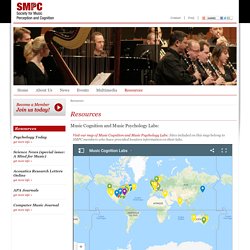
> Green markers indicate labs with associated graduate programs in music. > Yellow markers indicate labs with associated graduate programs in psychology / neuroscience > Red markers indicate labs with associated graduate programs in music and psychology / neuroscience > Purple markers indicate labs with associated graduate programs in electrical engineering / computer science > Blue markers indicate labs without associated graduate programs.
Mood & Music. Musical preference is unique to the listener.
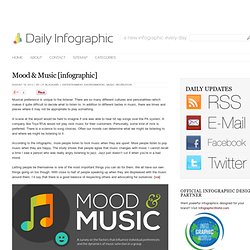
There are so many different cultures and personalities–which makes it quite difficult to decide what to listen to. In addition to different tastes in music, there are times and places where it may not be appropriate to play something. A scene at the airport would be hard to imagine if one was able to hear hit rap songs over the PA system. A company like Toys’R'Us would not play rock music for their customers. Personally, some kind of rock is preferred. The Real Neuroscience of Creativity. So yea, you know how the left brain is really realistic, analytical, practical, organized, and logical, and the right brain is so darn creative, passionate, sensual, tasteful, colorful, vivid, and poetic?

No. Just no. Stop it. Please. Musical Cognition. What can studying musicians tell us about motor control of the hand? - Watson - 2006 - Journal of Anatomy. Training the Musical Brain. Tonight is opening night.
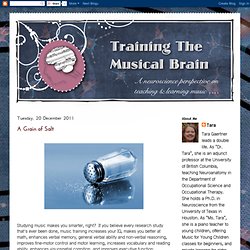
I can already imagine it: the theatre is full. From the wings I can hear muted pre-show conversations, the rustle of programs, laughter. The house lights go down, and the tension in my stomach tightens; my intestines feel like knots. Training the Musical Brain. Clinical Neuroscience-Research Grants. Musical Creativity and the Brain. Managing your talents? On August 29 and 30, 2013 the Conservatorium van Amsterdam, the University of Amsterdam, and VU University will organize the Managing Your Talents conference.
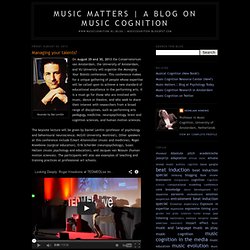
This conference makes for a unique gathering of people whose expertise will be called upon to achieve a new standard of educational excellence in the performing arts. Why Music Makes Our Brain Sing. Photo MUSIC is not tangible.
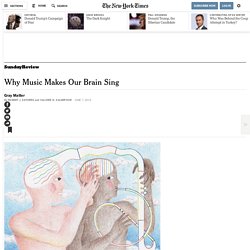
You can’t eat it, drink it or mate with it. It doesn’t protect against the rain, wind or cold. It doesn’t vanquish predators or mend broken bones. Why Your Brain Craves Music. If making music isn’t the most ancient of human activities, it’s got to be pretty close.
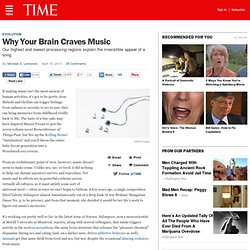
Melody and rhythm can trigger feelings from sadness to serenity to joy to awe; they can bring memories from childhood vividly back to life. The taste of a tiny cake may have inspired Marcel Proust to pen the seven-volume novel Remembrance of Things Past, but fire up the Rolling Stones’ “Satisfaction” and you’ll throw the entire baby-boom generation into a Woodstock-era reverie. Program - Conservatorium van Amsterdam. Musical Cognition. Listening to Music Prompts Numerous Brain Changes.
By Dr.
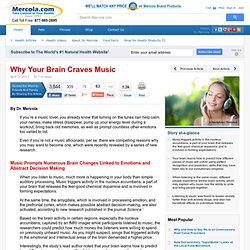
Mercola. The Health Benefits Of Listening To Music. By Dr Mercola If you’re a music lover, you already know that turning on the tunes can help calm your nerves, make stress disappear, pump up your energy level during a workout, bring back old memories, as well as prompt countless other emotions too varied to list.

Even if you’re not a music aficionado, per se, there are compelling reasons why you may want to become one, which were recently revealed by a series of new research. Music Prompts Numerous Brain Changes Linked to Emotions and Abstract Decision Making When you listen to music, much more is happening in your body than simple auditory processing. Music triggers activity in the nucleus accumbens, a part of your brain that releases the feel-good chemical dopamine and is involved in forming expectations. The Mozart Effect by Matthew Leighton on Prezi.
The Mozart Effect. In the last few years, a lot of attention has been drawn to scientific experiments designed to prove or disprove what is called "the Mozart effect".
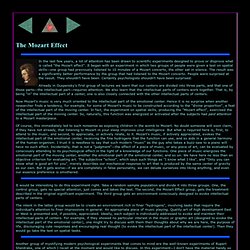
It began with an experiment in which two groups of people were given a test on spatial skills—one group had previously listened to 10 minutes of a Mozart concerto, the other sat in silence. The result was a significantly better performance by the group that had listened to the Mozart concerto. People were surprised at the result. They shouldn't have been. Certainly psychologists shouldn't have been surprised. Already in Ouspensky's first group of lectures we learn that our centers are divided into three parts, and that one of those parts—the intellectual part—requires attention. Now Mozart's music is very much oriented to the intellectual part of the emotional center. The Mozart Effect: A Closer Look. Enrst Strüngmann Forum - Language, Music, and the Brain - Photos. Ernst Strüngmann Forum Music, Language, and the Brain A Mysterious Relationship Sunday Opening Session Click <<here>> for an index of all the images Schizophrenia Evolution and Synthesis.
Supplementary data. The Benefits of Music Education . Music & Arts . Education. Whether your child is the next Beyonce or more likely to sing her solos in the shower, she is bound to benefit from some form of music education. Research shows that learning the do-re-mis can help children excel in ways beyond the basic ABCs. More Than Just Music Research has found that learning music facilitates learning other subjects and enhances skills that children inevitably use in other areas.
“A music-rich experience for children of singing, listening and moving is really bringing a very serious benefit to children as they progress into more formal learning,” says Mary Luehrisen, executive director of the National Association of Music Merchants (NAMM) Foundation, a not-for-profit association that promotes the benefits of making music. Making music involves more than the voice or fingers playing an instrument; a child learning about music has to tap into multiple skill sets, often simultaneously.
Examining the association between music lessons... [Br J Psychol. 2011. Neural substrates of spontaneous musical performanc... [PLoS One. 2008. NAfME – National Association for Music Education. Links. Tod Machover and Dan Ellsey play new music. Charles Limb: Your brain on improv. Why Does Music Make Us Feel? As a young man I enjoyed listening to a particular series of French instructional programs. I didn’t understand a word, but was nevertheless enthralled.
Was it because the sounds of human speech are thrilling? Not really. Large-scale brain networks emerge from dynamic pr... [Neuroimage. How music touches the brain. Finnish researchers have developed a new method that makes it possible to study how the brain processes various aspects of music such as rhythm, tonality and timbre. The study reveals how a variety of networks in the brain, including areas responsible for motor actions, emotions, and creativity, are activated when listening to music. According to the researchers, the new method will increase our understanding of the complex dynamics of brain networks and the way music affects us. Responding to Argentinian tango Using functional magnetic resonance imaging (fMRI), the research team, led by Dr.
Music and Brain Blog at University of Toronto. Table of Contents — January 2013, 60 (4) Music Cognition Resource Center - Journals. How Music Benefits The Brain. LAPhil and USC neuroscientists launch 5-year study of music education and child brain development. The Los Angeles Philharmonic Association, the USC Brain and Creativity Institute and Heart of Los Angeles (HOLA) are delighted to announce a longitudinal research collaboration to investigate the emotional, social and cognitive effects of musical training on childhood brain development.
The five-year research project, Effects of Early Childhood Musical Training on Brain and Cognitive Development, will offer USC researchers an important opportunity to provide new insights and add rigorous data to an emerging discussion about the role of early music engagement in learning and brain function. The Power of Music: Mind Control by Rhythmic Sound. ICMPC-ESCOM 2012. Auditory Neuroscience Laboratory. Hierarchical Structures in Music. Welcome to the website of the Music Perception and Cognition Lab — MPCL Homepage. Manfred Clynes. Music Cognition News. Bringing current research to music therapy clinicians. Introduction to The Neurosciences and Music IV: Learning and Memory - Altenmüller - 2012 - Annals of the New York Academy of Sciences. How to Cite Altenmüller, E., Demorest, S.M., Fujioka, T., Halpern, A.R., Hannon, E.E., Loui, P., Majno, M., Oechslin, M.S., Osborne, N., Overy, K., Palmer, C., Peretz, I., Pfordresher, P.Q., Särkämö, T., Wan, C.Y. and Zatorre, R.J. (2012), Introduction to The Neurosciences and Music IV: Learning and Memory.
Annals of the New York Academy of Sciences, 1252: 1–16. doi: 10.1111/j.1749-6632.2012.06474.x Author Information. Ahead of Print Articles (date view) Music Psychology Dr Victoria Williamson. Music Cognition U. - A Resource Center. Music underlies language acquisition, theorists propose. Theory: Music underlies language acquisition. Music Cognition U. - A Resource Center. Neuroscience. Music and language. "French babies cry differently as compared to German babies. This was the conclusion from a study that was published a year ago in Current Biology (see earlier entry). Three day old German babies cry in a downward fashion, their French contemporaries showed an increasing swelling of the cry and stop abruptly.
It was a surprising observation, especially in the light of the general belief that in crying the pitch should always drop as a physiological consequence of the respiratory cycle. Music Cognition Group, ILLC. Henkjan Honing, Ph.D.